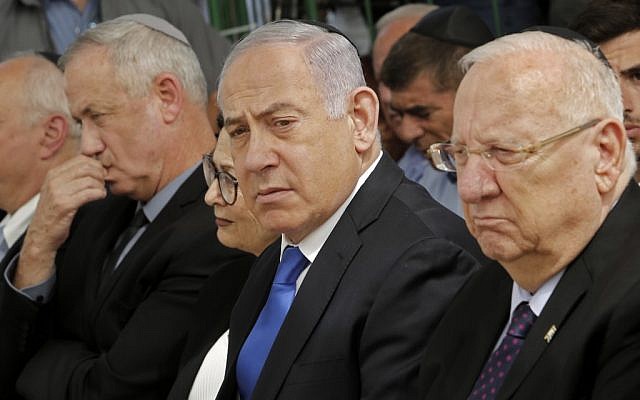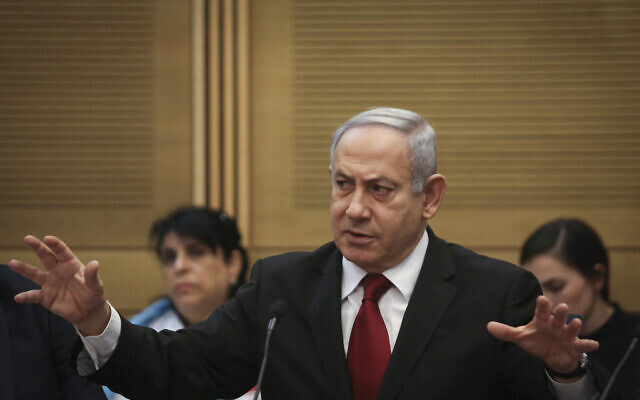Blue and White’s Benny Gantz said unwilling to share power with PM unless he commits to stepping aside if indicted, and not seeking parliamentary immunity to avoid doing so
By TOI STAFF

From R to L: President Reuven Rivlin, Prime Minister Benjamin Netanyahu, Supreme Court President Esther Hayut and Blue and White leader Benny Gantz attend a memorial ceremony for late president Shimon Peres, at Mount Herzl in Jerusalem on September 19, 2019. (GIL COHEN-MAGEN / AFP)
A unity coalition proposal by President Reuven Rivlin stalled when Prime Minister Benjamin Netanyahu wouldn’t commit to not seek parliamentary immunity from his corruption investigations, according to a TV report Thursday.
The Channel 13 report delineated Rivlin’s proposal for a power-sharing rotation between Netanyahu and his centrist opponent Benny Gantz following the September 17 election.
Rivlin suggested that Netanyahu would be prime minister first, but would take a leave of absence from the position when he is indicted.
Gantz reportedly demanded that Netanyahu step down when Attorney General Avichai Mandelblit announces his decision to indict the premier, which could come within 10 days, according to Channel 13. Netanyahu replied that he would not step down until the trial begins, a potential delay of many months. Rivlin suggested a compromise: that Netanyahu step down when the indictment is formally filed some months after Mandelblit’s announcement.
The question is politically sensitive for Gantz, who vowed ahead of the April and September elections not to sit with Netanyahu while he is under investigation or indictment.

Ordinary cabinet ministers are required to resign when indicted, but no clear precedent sets the rule for a prime minister, who under the strict letter of the law is only required to resign if he is convicted.
According to Channel 13, Gantz did not like Rivlin’s proposal because of what he saw as a potential loop-hole: that Netanyahu may try to escape indictment by asking the Knesset to confer parliamentary immunity on him.
Such a move would likely delay the indictments, and could potentially trigger a political battle in the Knesset House Committee and in the plenum that could destabilize the coalition, drive new elections – and leave Netanyahu in power and unindicted the entire time.
Gantz has reportedly demanded a commitment from Netanyahu not to seek parliamentary immunity, but he has refused. Sources close to Netanyahu have insisted that giving up his right to seek immunity would be tantamount to surrendering his right to a legal defense.
Gantz, realizing that the immunity bid could derail a coalition operated under Rivlin’s proposal midway through its term, with Netanyahu as premier, has therefore declined to pursue the president’s framework.

After Yisrael Beytenu chief Avigdor Liberman urged both Gantz and Netanyahu to accept the president’s proposal, Gantz told journalists Thursday he was “prepared to consider any option that will uphold my principles in terms of [Netanyahu’s] indictment.”
According to the Channel 13 report, Netanyahu initially embraced the leave of absence proposal, under which Gantz would become interim prime minister if he steps aside, quipping, “We’ll both be prime minister together.”
Rivlin reportedly corrected him sternly, saying, “There can’t be two prime ministers… When you take a leave of absence, all your [prime ministerial] authority will be removed.”
Rivlin also urged Gantz not to rule out a coalition with rightist and Haredi parties, a key demand of Gantz’s secularist allies within Blue and White and of the secularist Yisrael Beytenu party.
Rivlin’s call could mean religiously conservative parties allied with Netanyahu would effectively give the Likud leader a majority at the cabinet table.

But possibly to partly address that concern, Rivlin said the principle of equal power-sharing would mean the same number of cabinet ministers for each party.
Channel 13 also reported Thursday that Attorney General Mandelblit was working around the clock to try to reach a final decision on Netanyahu’s indictment in the three corruption cases, and hoped to publicize his decision within 10 days.
Mandelblit, who served as Netanyahu’s cabinet secretary and was appointed by him to the attorney general post in 2016, is widely believed to be leaning toward indicting the prime minister on corruption charges.
Netanyahu, who denies any wrongdoing in any of the cases, has repeatedly claimed that he is the victim of a witch hunt by the media, the left, police and the state prosecution designed to oust him from power.

Gantz has until November 20 to assemble a coalition. He was tasked by Rivlin with forming a government after Netanyahu failed to do so following general elections in September, which left both Blue and White and Likud short of a governing majority with allied parties.
Gantz’s party has previously called for Netanyahu to step down as head of Likud due to the possible indictments pending against him in three corruption cases, saying it will not serve under a prime minister facing grave charges of criminal wrongdoing. Blue and White has said a unity government with Likud could be formed “within an hour” if Netanyahu steps down.
Blue and White and Likud have regularly blamed each other for the lack of progress in negotiations and sought to cast the other as responsible if the country is forced to go to third elections within a year. The two previous rounds of voting in April and September failed to give either party a clear path to a majority coalition.



@ Adam Dalgliesh:As we were discussing the other day that many believe that the Blue/White and Israel are not that different there is a whole article (finally in English) on this.
@ Sebastien Zorn:You asked a very good and fair question:
Many people plus some of the politicians have brought this up and tried to get some of these people kicked out of the Knesset and when some have been kicked out in the end it is appealed to the Supreme Court and then allow them into the Knesset.
In May this came up see here for part of the story at least http://www.israelnationalnews.com/News/News.aspx/260017
@ Bear Klein: Certainly an interesting analysis.
It is hard to know what “ordinary” Israelis who are neither politicians nor journalists think concerning how large the policy differences between Likud and Blue-White are. Israeli polls often seem to ask responders questions that have a “spin” or “thrust” to them that exerts a bias on the answers they receive. How people respond to pollsters seems to be heavily influenced by the precise way questions are asked. In addition, it is always difficult to know how representative the polling samples are, since many people hang up the phone as soon as someone mentions they are “conducting a survey,” or when they ask who has commissioned the survey and don’t like the response they are given.
It is certainly true, however, that nearly all the pundits in the media believe that there is little in the way of significant policy differences between the two largest parties. I think they are wrong, based on my own independent analysis of the available “evidence.” One major problem is that Benny Gantz has tended to be evasive or noncommittal about his views, and even secretive about them. He is a very tight-lipped guy. Some of his critics interpret this to mean that he has no definite policies and has trouble making up his mind. I think that he tends to be secretive about some of his policies because he knows that they would make him and his party unpopular. It is more in his, and Blue-White’s interest if people believe that the only issue separating the two parties is Bibi and his future role, or lack of it, in the government. Dumping Bibi is popular with about half of the Israeli electorate, and with the overwhelming majority of what might lossely be called Israel’s “ruling classes.” I think that Blue-White’s peace-and-national-security agenda would much less support than their criticisms of Bibi, if people grasped what that agenda was. I don’t think they do.
On the question of the “more remote” settlements–nearly all of them are within twenty miles of either the Gush Dan urban complex, Jerusalem, or both. Many of them are only 5 miles from one or the other of these two major Israeli urban areas. From hills in certain of the “remote” settlements, the entire Tel Aviv area is clealy visible to the naked eye. With ordinary binoculars, you can get a clear view of individual buildings, such as the defense ministry building. Yet these “remote” settlements are considered to be outside the major “settlement blocs.”
It is only in Israel that locations 20 miles away, or in some instances 5 miles away, are considered to be “remote” from one’s home. I have to drive more than 20 miles and back several times a week to visit my (all too numerous) doctors and dentists, who are located all over semi-suburban, semi-urban, and semi-rural Orange County, NY. I have to drive as much as 40 miles and back to visit some of them. Most Americans don’t think of these differences as very great. In California, people think nothing of driving 200 miles to see a doctor, visit a friend, or attend a concert or a football match. Israelis seem to have an ultrminiaturized concpet of remoteness.
Israelis also have an incredibly blase attitude towards the danger they are in. One widely shown video clip shows a Hamas rocket exploding on one of Israel’s major highways. But the drivers just drove past the exploding missile, ignoring it. The road wasn’t even closed! Only in Israel.
No wonder, then, that many Israelis haven’t grasped the danger they will be in once Gantz becomes Prime Minister.
@ Adam Dalgliesh:
Most Israelis do not think Blue/White and Likud are that far apart on most policy issues. The Blue/White has several ex-Likudniks who left because of Bibi. The biggest obstacle is Bibi too them.
They are not focusing on what you are focusing on. Not that they are exactly the same. Coalitions have consisted of parties way farther apart on policies. On State/Religion issues the Likud and Blue/White would have no problem compromising and agreeing without the UTJ/Shas making up coalition rules.
In such a unity government no one would get everything they want as Bennett has pointed but the majority of Israelis now want this. Bibi is the biggest factor due to the hate of many in the Blue/White towards him.
There would be no withdrawals in such a government nor would every place the Likud would want to apply civil law happen. They would agree on the Jordan Valley and Dead Sea plus the major Blocks but not on the more remote settlements.
You asked,
The biggest objection many have in the Blue/White is Bibi. There are several ex-Likudniks in Blue/White. So this would overcome a major objection. Many of them are not so far apart on most policies with the Likud. Yes, they would prefer not to deal with the UTJ. Shas would likely bend to what they may require on religion/state issues, though likely not all.
By the way they have in the past said they would split time with another Likud MK as PM but not Bibi especially if he is indicted.
By the way I think it is time for new leadership as my personal view. Bibi has done many good things but it is no longer healthy for Israel.
Ganz is now making the dismantling of the right-wing bloc a precondition for unity. There is going to be a third election. The real elephant in the room is why the anti-Zionist parties of the Arab List are never disqualified in violation of Basic Law. Now they are expected to increase their mandates to 13 in a third election? They are both racist – against Jews – and anti-Zionist. Why is no one raising this? Fear of being called racist?
@ Bear Klein:Bear, what makes you think that Blue-White would prepared to serve under another Likudnik ? I am asking this question in good faith and not rhetorically. I would genuinely like to pick your brains on this subject.
Although I have called attention to the personal animosities between some of the politicians, I don’t think this is the main obstacle to a coalition government. Rather there are serious policy differences between Blue-White and Likud. Likud wants to avoid a fully independent Palestinian state if possible. They want to retain security control over all of Judea Samaria.
Most Likudniks want Orthodox Judaism to remain Israel’s established religion. Blue-White wants a fully independent Palestinian state in the mountainous central regions of Judea-Samaria, plus Gaza, the rmoval of Jewish settlers outside the major settlement blocs outside the Jordan Valley, and a reconciliation between Fatah and Hamas that will permit a united Palestinian state Likud is prepared to negotiate with Fatah-PLO =Palestinian Authority -“State of Palestine,” while Blue-White is willing to negotiate with Hamas as well in order to crete a viable Palesinian state.
Most Likudniks want Orthodox Judaism to remain Israel’s established religion. At least half of Blue-White and most of their prospective leftist coalition partners, as well as the Leiberman group, want Israel to be a purely secular society. That makes them very reluctant to join a coalition with either Likud or the religious parties.
That is the real reason why I think a coalition government between the right-of-center and the left-of-center parties is unlikely. If Netanyahu steps down as Prime Minister and leader of the Likud, it would remove a personal “irritant” to the situation, but would not removal the fundemental obstacles to a left-right coalition. All of the possible replacements to Netanyahu as party leader are in fundamental agreement with him on these issues. Nearly all the Likud MKs as well.
That at any rate is my take on the situation. But I would like to know your views about this “policy obstacles” problem and whether it can be overcome.
Obviously, all Gantz has to do is tostall things until the A-G announces his decision to indict Netanyahu. The A-G has clearly decided to do what he can to indict Netanyahu before Gantz is forced to call for a vote of confidence on his entirely leftist-anti-Zionist coalition government. Revlon can always give Gantz and Lapid two more weeks to stall, if the A-G is a few days late delivering his verdict.
Gantz’s deal-breaking caveats to the Rivlin proposal make it plain he has rejected it. But out of repect for the President and Israeli public opinion, he hasn’t said so in so many words. He doesn’t want to be blamed when the coalition negotiations fail, although he doesn’t intend to let them succeed. In any case, he knows he can posture as somewhat flexible on this issue, because he knows his coalition partner Lapid will never agree to Netanyahu serving in the government, and obviously it is not in his interest to break with half of the Blue-White list.
@ David melech:Your questions plus many more are unanswered.
There are three potential cases and how long will it take to prosecute those cases. Will they be prosecuted all at once or in three separate trials.
Will he cut a deal to stay of jail, if his lawyers think he will be found guilty of one or all the cases.
All this and more is instability that the country is put through.
I think he should yield to another Likudnik for the good of the country if charged to run the Likud. This sharing the PM job is just political hocus pocus. I do not think Gantz is qualified nor do I trust him.
But is he guilty? If not does he walk back into P M job or as M K. If he is does he retire on full pension?
Is this a no win no loose situation?
It has been reported that by about Tuesday the Likud believes Bibi will be indicted.
Israel political stability requires that a new MK take over as the head of the Likud (eg. Saar or Barkat). Until that happens no unity government or right wing government will be stable.